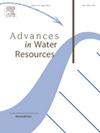A hybrid CNN-transformer surrogate model for the multi-objective robust optimization of geological carbon sequestration
IF 4
2区 环境科学与生态学
Q1 WATER RESOURCES
引用次数: 0
Abstract
The optimization of well controls over time constitutes an essential step in the design of cost-effective and safe geological carbon sequestration (GCS) projects. However, the computational expense of these optimization problems, due to the extensive number of simulation evaluations, presents significant challenges for real-time decision-making. In this paper, we propose a hybrid CNN-Transformer surrogate model to accelerate the well control optimization in GCS applications. The surrogate model encompasses a Convolution Neural Network (CNN) encoder to compress high-dimensional geological parameters, a Transformer processor to learn global patterns inherent in the well controls over time, and a CNN decoder to map the latent variables to the target solution variables. The surrogate model is trained to predict the spatiotemporal evolution of CO2 saturation and pressure within 3D heterogeneous permeability fields under dynamic CO2 injection rates. Results demonstrate that the surrogate model exhibits satisfactory performance in the context of prediction accuracy, computation efficiency, data scalability, and out-of-distribution generalizability. The surrogate model is further integrated with Multi-Objective Robust Optimization (MORO). Pareto optimal well controls are determined based on Non-dominated Sorting-based Genetic Algorithm II (NSGA-II), which maximize the storage efficiency and minimize the induced over-pressurization across an ensemble of uncertain geological realizations. The surrogate-based MORO reduces computational time by 99.99 % compared to simulation-based optimization. The proposed workflow not only highlights the feasibility of applying the CNN-Transformer model for complex subsurface flow systems but also provides a practical solution for real-time decision-making in GCS projects.
地质固碳多目标鲁棒优化的CNN-transformer混合代理模型
随着时间的推移,井控的优化是设计经济高效、安全的地质固碳(GCS)项目的重要步骤。然而,由于大量的仿真评估,这些优化问题的计算费用对实时决策提出了重大挑战。在本文中,我们提出了一种混合CNN-Transformer代理模型来加速GCS应用中的井控优化。代理模型包括一个卷积神经网络(CNN)编码器,用于压缩高维地质参数,一个Transformer处理器,用于学习井控随时间变化的全局模式,以及一个CNN解码器,用于将潜在变量映射到目标解变量。该替代模型用于预测动态CO2注入速率下三维非均质渗透率域中CO2饱和度和压力的时空演化。结果表明,该模型在预测精度、计算效率、数据可扩展性和分布外泛化性等方面表现出令人满意的性能。该模型进一步与多目标鲁棒优化(MORO)相结合。Pareto最优井控是基于非支配排序遗传算法II (NSGA-II)确定的,该算法可以最大限度地提高存储效率,并最大限度地减少不确定地质条件下的诱导超压。与基于模拟的优化相比,基于代理的MORO减少了99.99%的计算时间。提出的工作流不仅突出了CNN-Transformer模型应用于复杂地下流系统的可行性,而且为GCS项目的实时决策提供了实用的解决方案。
本文章由计算机程序翻译,如有差异,请以英文原文为准。
求助全文
约1分钟内获得全文
求助全文
来源期刊

Advances in Water Resources
环境科学-水资源
CiteScore
9.40
自引率
6.40%
发文量
171
审稿时长
36 days
期刊介绍:
Advances in Water Resources provides a forum for the presentation of fundamental scientific advances in the understanding of water resources systems. The scope of Advances in Water Resources includes any combination of theoretical, computational, and experimental approaches used to advance fundamental understanding of surface or subsurface water resources systems or the interaction of these systems with the atmosphere, geosphere, biosphere, and human societies. Manuscripts involving case studies that do not attempt to reach broader conclusions, research on engineering design, applied hydraulics, or water quality and treatment, as well as applications of existing knowledge that do not advance fundamental understanding of hydrological processes, are not appropriate for Advances in Water Resources.
Examples of appropriate topical areas that will be considered include the following:
• Surface and subsurface hydrology
• Hydrometeorology
• Environmental fluid dynamics
• Ecohydrology and ecohydrodynamics
• Multiphase transport phenomena in porous media
• Fluid flow and species transport and reaction processes
 求助内容:
求助内容: 应助结果提醒方式:
应助结果提醒方式:


